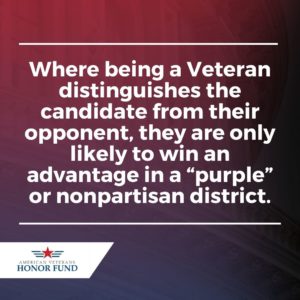There are countless reasons why we believe Veterans make the ideal office holders: they have already served their country honorably, they have sworn oaths to protect the Constitution of the United States, and they are trained to come together to accomplish a mission. In the rank partisanship of Washington, D.C. This is perhaps their greatest distinction from the professional political class which fills the halls of government.
But as we have covered previously, the number of Veterans serving in government, specifically Congress, has thinned over recent decades. There are perhaps a variety of factors, from access to political networks to the immense amount of fundraising necessary to compete against the Washington machine, but the simplest reason may also be the most significant. Since the end of the draft, fewer Americans have served in the armed services than in much of the first half of the 20th century.
Veterans Have a Greater Chance at Election in “Purple” Districts

While there may be fewer Veteran candidates running for Congress in recent decades, the ones who do run have still found notable success at the ballot box in recent decades. But where are they most successful?
This was a question pondered and analyzed by Jeremy Teigen for The Washington Post in 2017, in a piece titled “Do military veterans really win more elections? Only in ‘purple’ districts.” At the time, Democrats had been placing their hopes of retaking the House majority in the 2018 midterms on a group of Veteran candidates up against Republican opponents. The prevailing wisdom was that Veterans would have a greater chance than non-Vets in reclaiming these seats.
Teigen wasn’t so sure:
“But research suggests that any boost veterans may bring the Democrats will depend on where they run. And it is probably only in the most competitive congressional districts that being a veteran could be the difference between winning and losing.”
Veterans Running Against Non-Veterans
Teigen’s research informed him that Veteran candidates of either party tend to fare better against non-Veteran opponents, particularly within the lens of national security and foreign policy. The military being one of the few institutions earning nearly universal support from American citizens also certainly plays a factor.
But like in real-estate, the true advantage may simply come down to “location, location, location.” Teigen illustrated this point with results from elections featuring Barack Obama on the presidential ticket:
“Where Republican non veterans were running, Obama’s average vote share was 68.4 percent. Where GOP veterans were running, it was just 63.5 percent. To put it more directly, Republican veterans ran for seats that were five points more hospitable than their non-veteran counterparts.”
The inverse appeared to be true for Democrats:
“For example, in districts where the Democratic challenger was not a veteran, President Barack Obama’s average vote share in the 2008 and 2012 presidential contests — a good measure of a district’s partisan leanings — was 42.3 percent. But in districts where the Democratic challenger had served in the military, Obama’s vote share was just 39.4 percent.”
Where Do Veterans Win Elections?
The conclusion of Teigen’s research into “where do Veterans win?” is this: Where being a Veteran distinguishes the candidate from their opponent, they are only likely to win an advantage in a “purple” or nonpartisan district. By implementing a strategy of using Veteran Democrats to defeat Republican incumbents in 2018, Democrats failed to learn the lessons presented by data presented here by Teigen from Obama era elections in 2008 & 2012. Ultimately it appears that Veterans have the best advantage over non-Veteran rivals in locations where party politics play less of a role in a guaranteed victory for a given candidate.
At the federal level, we are encouraged to see that as the post 9/11 era progresses, a new generation of Veterans is rising in the ranks of Congress with each new election cycle. And it appears that this momentum is being shared at the state level, as well.


